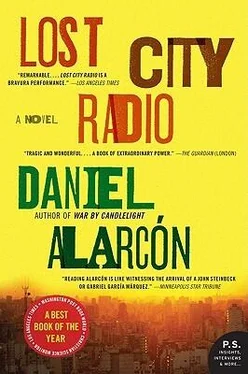The road was bumpy, and Victor hardly slept, his head knocking against the window a dozen times in the night. Manau gave up his seat to an old man, sat stolidly on an overstuffed suitcase in the aisle, eventually sleeping with his head cradled in his hands. Victor was alone, and he’d never left the village before. Outside, there was only darkness, the blue-black sky indistinguishable from the earth. Just before morning, a thin line of red appeared at the horizon. He was in the mountains now. In the dim violet light, the ridges seemed like the ruddy spine of an alligator. Beside him, the old man slept, snoring fiercely, his head back and mouth agape, a stack of shiny plastic sheets in his lap. They looked like giant photographs. Victor had seen something like this in school. In a book. He thought he could recognize in them bones and the shape of a human chest. The old man’s white hair was thin, his lips parched. Victor looked down again at the photographs: there were ribs! He touched his own, felt his skin slide over the bones. He felt his own chest, with the pictures before him like a map, this cloudy photo of a man’s heart. They shone and had the color of science about them. He wanted to touch them, but the man’s hands lay over them, even as he heaved and choked in his sleep. The sky was stained orange, now yellow, and the world outside was revealed, dusty and fawn, a scarcely living disappointment. Something dry and withered poked out from the pebbled earth. The bus moved slowly. Victor wanted to hold the photographs up to the light. When the man coughed himself awake, Victor tapped him.
“These?” the old man said, smiling. “I’m sick, child.”
“I’m sorry.”
“So is my wife,” he said. “She’s sorry. And my children too. And me.”
The bus was waking now, but most of the curtains were still pulled to block out the rising sun. In the distance, the mountains seemed to be made of gold.
“Are you going to be okay?” Victor asked.
The old man frowned for a moment. “I’ll show you.” His fingers were thick and calloused. Pulling off the first of the sheets, he reached over Victor and placed it against the window. The morning light shone through the film. Victor saw a man’s chest, his rib cage, his arms at his sides. Victor even saw his spine. The image cut off just above the jaw, a slab of white jutting unexpectedly into the frame.
Victor looked at the photograph and then at the old man. “Is it you?” he asked.
“Have you seen an X-ray before?”
Victor admitted he hadn’t. He’d never heard the term before.
“Yes, it’s me.”
“What’s wrong with you?”
The man sighed. He had a deep, red scar on his cheek, and he touched it carelessly. “My bones and my heart,” he said in a singsong voice. “My lungs and my brain and my blood!”
“Everything?”
“Everything,” he said brightly. “I am the complete man.” He coughed and pulled another X-ray from the stack, placing it against the window. “These are my lungs,” he said and clapped his chest. “My puny, weak lungs.”
There were tiny holes in the tissue, like scattered coins.
“Diseased lungs,” the man whispered. He said there was a hospital, in the sierra outside the city, for veterans. He said he’d had medals, but he sold them when the war ended, to pay for his medicines.
“My father died in the war,” Victor said, and it was a fact he thought might be true, lost and dead being brothers.
“I’m sorry, child.”
It was nothing to say that his father was dead because he’d never really known him. His mother being dead? That was a secret wound, something dark and hidden, not to be told. Victor coughed.
“Don’t get too close to me, child. Not until I’m better. The air at the hospital is clean and dry. They’ll fix me up.”
They were silent for a while, and around them, the passengers shook off sleep, or held stubbornly to it. Manau hadn’t looked up yet. The bus rumbled along. They were between ranges, on a rocky plain. There was nothing green, nothing at all that seemed to be alive. Tufts of pale, weedy grasses grew in the shadows at the base of the rocks. A stocky plant with needles. “A cactus,” the old man said. To Victor, it looked as foreign, as strange as the moon or any distant planet. It was an ancient ocean, dry, disappeared. He imagined waves and currents and silver fish. He felt the note rubbing against his skin. His secret, his mission. Like the X-rays, the note was the picture of his insides. Next to him, the old man drifted in and out of sleep. Eventually, he coughed himself awake, and when he did, he winked at Victor. “I’m going to be fine,” he whispered just before his eyes clamped shut, his head falling back against the seat.
The man woke for good when the bus started climbing. “Almost there now,” he said. Then Victor took the note from his pocket, breaking the stitching with his long pinky nail. He didn’t know why he did it exactly; he just wanted the old man to know.
The old man unfolded the paper and read slowly. He turned it over to the list of names. “Have mercy,” he mumbled. “Are you traveling alone?”
Victor shook his head, and pointed at Manau. “My teacher is with me.”
The old man seemed reassured. “Shall we wake him?”
“He’s very tired.”
But Manau was up already. He kneaded his stiff neck and offered the old man a handshake. “We’re going to the radio,” he said when the old man asked what plans they had. “We’re going to see Miss Norma.”
“Will you see her, do you think? Will you really see her?” The old man looked back and forth between them, his face suddenly animated.
Manau shrugged. “I don’t know. I hope so.”
“Have you been there before? To the city?”
“Yes. I was born there.”
The old man sighed. “So you know the place. It’s where the soul of this country is.”
“In the city, they say it’s out here.”
“Who can tell?”
Victor couldn’t follow. The old man turned and smiled. He asked for the list and pulled a pen from his pocket. He held the note against his thigh and wrote a single name in a bouncing, jagged script that shook along with the bus. “It’s my son,” he said to Victor and Manau. “You understand.”
He got off in the next town. The hospital was there, a large, imposing building of brick and steel surrounded by an iron fence. Victor had never seen such a large construction. It looked like a factory he had seen in a picture once, dominating the minuscule town. “Home,” the old man said. “You’re not far now, child. Stay alert.” Then he folded a few bills into Manau’s palm. “Take care of him,” he said. Manau promised he would. The old man gathered his X-rays and his bags, and shuffled down the aisle.
Not long after, the bus crested a pass, and shacks began to appear along the sides of the road. First one or two, then clusters of them. Then they were a steady presence as the bus descended to the coast. The road was better, and the bus seemed to be gliding now. Victor finally fell asleep and awoke to honks and shouting, the city’s noise like a great engine: movement, a sputtering motor, the squalid borders of the capital, its sidewalks overflowing. The city had emerged all at once, the bus crept slowly through the crowded streets, and Victor peered out of his window. He wanted it all to be over. There was no sun, only a gray sky above, the color of the parchment he once did his school lessons on: at home with an oil lamp on the table, his mother frying fish, checking his penmanship and his spelling. That world was gone. The city moved like a forest moves: first sound, then sight, everything invisible and shadowed, a place full of walls. He felt glad to be on the bus, and he prayed it wouldn’t stop. This can’t be it, he thought. There were so many people and so much stone. There’s another, better place ahead, but then the bus was slowing, and then it was pulling into a lot, vendors ready to pounce at the arriving passengers: women with baskets of cheese balanced atop their heads, men selling batteries and sodas and lottery tickets adorned with pictures of the Virgin. Everyone yelling. “Let’s wait a moment,” Victor said. “Please.”
Читать дальше












